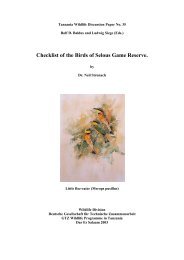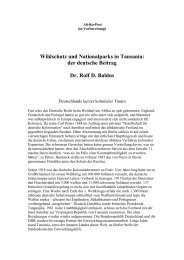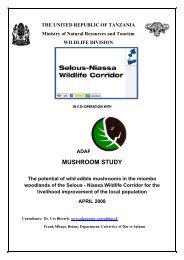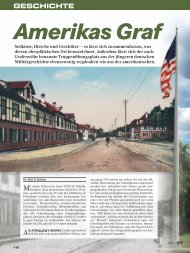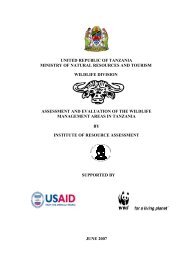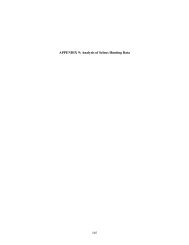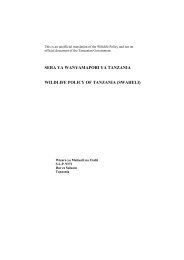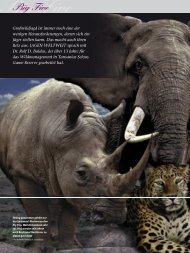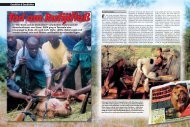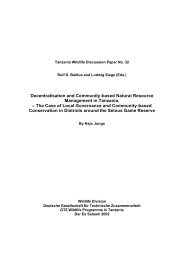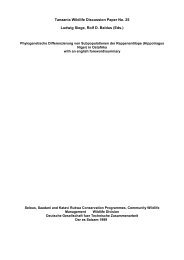African Indaba Articles - wildlife-baldus.com
African Indaba Articles - wildlife-baldus.com
African Indaba Articles - wildlife-baldus.com
Create successful ePaper yourself
Turn your PDF publications into a flip-book with our unique Google optimized e-Paper software.
Hunting in South Africa: Facts – Risks – OpportunitiesBy Gerhard R Damm (originally published in <strong>African</strong> <strong>Indaba</strong> Vo 3, Numbers 4 and 5)1. IntroductionSouth Africa is arguably the most sought after destination for traveling trophy hunters. And rightfully so,since the country offers so much to the visitor: a great variety of diverse habitats and landscapes on thesouthern tip of Africa; a selection of huntable trophy animals which is second to none in the world; a highlydeveloped professional hunting and game ranching industry as service providers; an excellent infrastructure;a wealth of other activities to <strong>com</strong>plement hunting and last not least the cultural richness and hospitality ofthe Rainbow Nation. Hunting in South Africa is a great experience for any visiting hunter, novice or seasonedold-hand.Hunting in South Africa is big business and contributes significantly to the national economy. However,the available statistical information lacks accuracy and depth. I therefore went through the Sisyphus task tocollect and analyze data from over 200 South <strong>African</strong> hunting websites. You can see the result in Table 1 onthe following two pages. I have also analyzed information from papers of different authors and brought it intocontext with personal experience and <strong>com</strong>munication with stakeholders.Trophy hunting is a specialized form of tourism through sustainable <strong>wildlife</strong> utilization. It is the practicalapplication of “Incentive- Driven-Conservation”. The World Conservation Union (IUCN) – gathered at the 3 rdWorld Conservation Congress in Bangkok in November 2004 – has adopted a re<strong>com</strong>mendation onsustainable consumptive use of <strong>wildlife</strong> and recreational hunting in Southern Africa proposed by the GameRangers Association of Africa, the Endangered Wildlife Trust and the South <strong>African</strong> National Parks 1 . With thisRe<strong>com</strong>mendation, IUCN “accepts that well-managed recreational hunting has a role in the managedsustainable consumptive use of <strong>wildlife</strong> populations”.In 2005 Minister Marthinus van Schalkwyk of the South <strong>African</strong> Department of Environmental Affairs &Tourism (DEAT) appointed a panel of experts to develop norms and standards for the regulation of huntingat a national level to ensure a sustainable hunting industry in South Africa. DEAT obviously perceived theexistence of a broader problem regarding the lack of an national framework for the regulation of the huntingindustry. In a media release after the appointment of the panel, DEAT stated that “there is a general lack ofconsistent scientific information regarding the scale and nature of the industry, and poor monitoring of thepractices … The hunting industry … is regulated according to provincial ordinances which are in many casesoutdated and not in line with current international best practices. It seems as if the central overarchingproblem with hunting in South Africa is that there is no coherent and <strong>com</strong>prehensive oversight of the huntingindustry and a lack of clear national norms and standards for sustainable hunting … Issues that need to beaddressed in such a framework include a definition of sustainable hunting, regulatory measures and thedelegation of permitting arrangements, joint management and scientific monitoring arrangements agreed tobetween government, national and provincial park authorities and private land owners, and monitoring of theallocation of any revenues generated through such hunting towards conservation.” This initiative of DEATpresents a great opportunity for the <strong>wildlife</strong> industry. In this paper I will therefore discuss some significantdevelopments and key figures, problems, opportunities and risks which in my opinion do have an impact onthe country’s hunting and conservation policies.Hunting, and in a broader sense the killing of any living being, is ethically objectionable for some sectionsof society. Other parts of society see nothing wrong with hunting as long as it is conducted ethically within theparameters of Fair Chase. The word “ethics” has, however, been grossly misused – especially by antihuntingorganizations – and is therefore misunderstood. Ethics is defined in the Oxford Dictionary as “TheScience of Morals”. A debate about “ethics” between people who have conflicting moral values, e.g. huntersand anti-hunters, even between different hunters will produce few, if any results. Therefore public debatesabout the morality and “ethics” of trophy hunting do not serve any practical purpose. The discussion mustrather be steered towards an acceptable regulatory framework and appropriate self-control mechanisms1 “IUCN Accepts Role of Recreational Hunting in Wildlife Conservation”, <strong>African</strong> <strong>Indaba</strong> Vol3/1 (www.africanindaba.co.za)4



